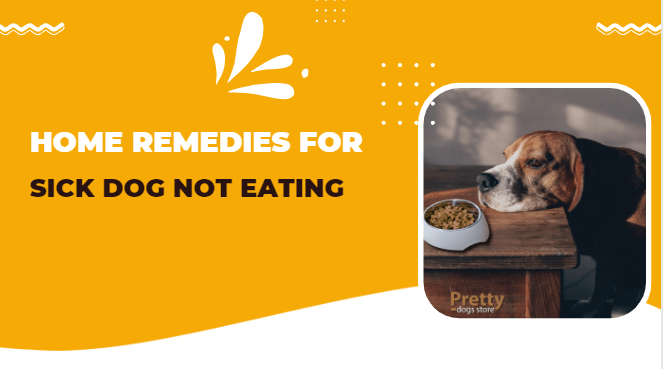My dog isn’t eating Why?
In general, sick dogs do not eat for two reasons. One is an upset stomach, while the other is a loss of appetite. It can be challenging to figure out why your dog is sick, especially when it suddenly stops eating.
7 Best Home Remedies For The Sick Dog Not Eating
The following home remedies are designed for dogs with mild stomach upsets such as gas, nausea, constipation, and diarrhoea. Always consult your veterinarian before receiving treatment with your own hands, as these symptoms may signify a more severe problem.
Consult your veterinarian before using these home remedies, excluding any other risks.
It would help if you also kept in mind that dogs with existing health issues like diabetes, cancer, and allergies may require nutritional support to stay healthy.
1- Prepare Wet Food
Generally, wet food contains more moisture than dry food. When your dog usually eats dry food and drinks a lot of water but is not eating or drinking due to an upset stomach or lack of appetite, you may want to try wet food.
Wet food is considered more palatable to dogs in addition to the moisture and is closer to their natural diet than dry food.
Let’s watch a video
2- Equipping Your Diet After Fasting
You feed your dog bland food after fasting for 12 to 24 hours. Chicken and boiled rice are the best blend of diet for a dog with an upset stomach. You need one part of boiled, skinless chicken and two cups or parts of cooked rice for the recipe preparation.
Also, avoid adding salts and oils. Both are not good for the stomach.
You can prepare this rice and chicken recipe two or three times a day. The dog needs to be on this diet until it fully recovers from diarrhoea and stomach issues.
Moreover, when your dog is returned to regular food after an illness, feed it chicken and rice meals at least once a day.
3- Pumpkin And Sweet Potato Recipe
It is believed that pumpkin and sweet potato have similar digestive health benefits. Pumpkin also contains fibre, which helps dogs’ digestive systems function correctly.
When cooked, peeled, unsalted, and unseasoned, pumpkin contains vitamin E, thiamine, niacin, vitamin B6, folate, iron, magnesium, phosphorous, dietary fibre, vitamin C, riboflavin, potassium, copper, and manganese, giving your dog a nutritional boost and improving digestion.
Pumpkin is generally helpful for controlling mild constipation in dogs. Depending on your dog’s size, veterinarians recommend one to four tablespoons of pumpkin.
If the canned pumpkin is not seasoned, it is a convenient substitute for preparing the pumpkin yourself.
If you give your dog a box of pumpkin pies, they may be sent back to the veterinarian, as spices and sugar can irritate its stomach and cause further complications. You can also add pumpkin powder to your dog’s food.
4- Preheating Dog’s Food
If your dog doesn’t eat, Preheating their food may be a unique but valuable trick. Warm food isn’t just more appealing to dogs; it can also contribute to developing its natural flavours and aromas.
Make sure the food is heated evenly and isn’t too hot for your dog to eat. You can heat your dog’s food using a microwave by placing it in a plastic bag and letting it sit in hot water or mixing some hot water directly into the food.
5- Boiling Bones
Dogs can easily digest boiling bones since it is a light liquid diet. Additionally, it’s a tasty, healthy way to add moisture to dried foods and encourage dogs who aren’t eating as much.
To make bone broth for dogs, casserole contains a lot of bone marrow in cattle and bones in joints such as turkey and chicken legs. Cover the bones with 2-3 inches of water, cover, and simmer on low heat for 20-24 hours.
Allow the soup to cool in the refrigerator for 2-3 hours to allow the fat to form a solid layer on top. Scoop it up and store the jelly-like juice in the refrigerator. If you want to use broth to moisten dry foods, use a microwave oven long enough to turn the semi-solid jelly into a liquid, but hot soup can burn the dog’s mouth.
Therefore, it is not long enough to heat. Freeze the broth in a small container such as an ice tray for later use.
6- A Probiotic Supplement
Dog probiotics help improve or maintain digestion by increasing the amount of “good” bacteria in the gut.
There is the possibility that if your dog was recently on antibiotics, the medicine might have destroyed beneficial microorganisms in the GI tract, allowing harmful bacteria to proliferate and causing GI issues.
Introducing supplements to your dog should always be discussed with your veterinarian.
7- Grooming on Grass
The grass is one of the instinctive home remedies that dogs rely on when they feel sick, or you might think so. If the dog vomits after eating grass, the dog’s behaviour may be offensive and not the other way around.
Evidence also shows that improving digestion, treating intestinal parasites, or meeting some unmet nutritional needs are some of the reasons dogs eat grass.
If your dog continues to eat grass, consider feeding it. This may be what they need to feel good. Keep your dog well hydrated and be aware of the potential for pesticides.
Precautions
- If your dog’s digestive issues do not resolve within 48 hours, you should contact your veterinarian.


